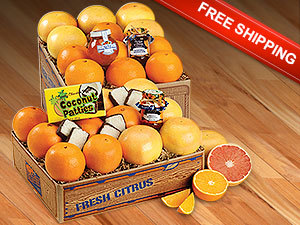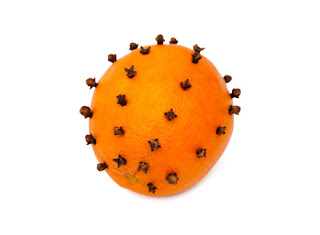Ahhh, Florida--the land of Mickey Mouse, sugar sand beaches, sunshine, juicy oranges from the groves of Florida Fruit Shippers, and....hurricanes. While Florida basks in an ideal climate for growing citrus during most of the year, those perfect days can occasionally get stormy. During what's known as "hurricane season" from June 1 through November 30 of each year, they can even get downright dicey. During the past two centuries, hurricanes in every category have made landfall and moved across our orange grove regions. Depending on the intensity of the winds, flooding, the speed of the movement of the storm, and other factors, citrus groves can be impacted. But don't worry: we are Floridians, and we've learned over the years how to keep close watch during these times to ensure your fruit is ripe, delicious, and undamaged.
How Do Hurricanes Affect Our Groves?
When we think of hurricanes, we usually imagine ferocious, whipping winds. Most of us are familiar with storm news footage showing palm trees bent all the way over, fronds nearly dusting the ground. While healthy doses of brisk winds are important for trees in general to promote healthy, stable root structures, those same trees can conversely be severely damaged if winds reach hurricane strength, especially over an extended duration. Citrus trees are no exception. Hurricane force winds can easily strip tender trees of their fruit and, if high enough in intensity, damage their structure and vital root systems. Hurricanes also often bring flooding, which can cause a whole host of other problems. The standing water from flooding and the longer-term saturation of the soil can weaken roots and make them prone to soil-borne diseases in the weeks and months that follow a hurricane strike. If salt water floods a near coastal grove, the trees can get salt damage. When any of these things happen, subsequent fruiting from damaged trees can be sub-par, and time is needed for recovery.
What Number?
Hurricanes are rated on what's known as a Saffir-Simpson scale, which rates wind speeds. Not taking into account the speed that a storm moves through an area, relative location to the coast, and impacts of flooding, these are the general guidelines as per how hurricanes affect citrus groves:
Category 1 (74-95 mph): Some loss of leaves and fruit.
Category 2 (96-110 mph): Significant leaf and fruit loss, some trees can be blown down.
Category 3 (111-130 mph): Extensive leaf and fruit loss, with large numbers of trees blown over.
Category 4 (131-155 mph): Trees likely completely stripped, most blown down and off site.
Category 5 (over 155 mph): Total devastation.
Groves and Hurricanes: Some History
When Hurricane Nicole recently struck near Vero Beach, our navel oranges were impacted. As such, the high quality navels you will receive from us will be sourced from a grove outside of the hurricane-affected area. Here at Florida Fruit Shippers we are constantly monitoring the quality of our groves and fruit to make sure you are receiving the most delicious product from the healthiest trees. Monitoring citrus groves during hurricane season is an important part of our job! Take 2004, for example. Four hurricanes--Charley, Frances, Jeanne, and Ivan--moved right up through the center of the state sequentially. While they were "only" category 1-2 level storms by the time they moved up the state, the constant rain, wind, and flooding really affected our groves, and there was considerable damage to the buildings as well. Prior to that 2004 "fearsome foursome," the last time hurricanes caused that much damage to the citrus industry was back in the 1940's. With the very recent Hurricanes Ian and Nicole, we've seen some impact in 2022, though not nearly to such an extent. Fortunately, many measures are in place to minimize damage and maximize recovery.
What Floridians Do In a Hurricane
Not surprisingly, Floridians turn to citrus during those occasional hunker-down periods when we are stormbound. Whether sheltering from a hurricane as it is passing over or riding out days of power outages, tangerines, premium oranges, and grapefruits all make for amazing snacks that require no refrigeration and are packed with essential vitamins and nutrients to keep us sustained as we navigate through. It's also a great time to break out the special treats we offer, to brighten up the stormy days! With wintertime fast approaching, the same concept applies to snowstorm days up north. Heck, citrus can even brighten us up through times when the internal weather is less than ideal. Keep a stock of citrus and treats on hand, and you'll ride out all of life's storms with ease.
Sources:
https://crec.ifas.ufl.edu/media/crecifasufledu/faculty/rogers/27Albrigoetal2006.pdf
https://climatecenter.fsu.edu/topics/hurricanes







